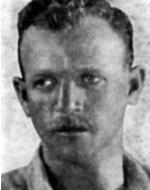Slitinsky, Israel-Fishel (Fiske)
He was born on December 7, 1921 in Czertkow, in eastern Galicia, and in December 1922 came to Israel and settled in Tel-Aviv, where he studied at Beit- He joined the “Hanoar Haoved” youth movement and as a young boy he “already lived life in the city,” as he put it, and went to agricultural training at Kibbutz Ginegar and remained there as a permanent member, working in all branches of the agriculture, Israel-Fishel was an outstanding athlete, one of Hapoel’s best footballers in the Emek and received several medals and prizes for achievements in various fields of Ethel He was also active in cultural and social activities in the area and in the surrounding communities, and he also tended to work in the organization, preparing balls and parties, and was described by the younger generation as “the favorite young man in the valley.” And during the war he joined the “Dror” battalion of the “Golani” Brigade and continued to engage in cultural activities among his comrades who were recruited from the valley, as he did in civilian life. He finished a heavy machine-gun course and used a machine gun to the end. He passed the first baptism of fire when he hurried to Mishmar Ha’emek, continued in the Beisan Valley farms against the gangs and then against the Syrians and the Iraqis in the Lower Galilee. Israel-Fishel fell with several other comrades in the battle over the village of Lubia, which was one of the most important enemy strongholds in the Lower Galilee. It blocked the road to Tiberias and could serve as a springboard for an attack in the direction of Afula. On June 9, Golani forces attacked the village from the direction of Sajara, and another force, in armored vehicles, moved along the road from Tiberias. The attacking force encountered fierce resistance from the enemy, who even sent reinforcements to the area. The battle was fought until nightfall and finally the forces had to retreat. This battle took place on Monday, June 9, 1948. Only 42 days later, when the enemy was repulsed, were the bodies brought to eternal rest in a mass grave in Mishmar Ha’emek, the first place of battle for Israel-Fishel.
